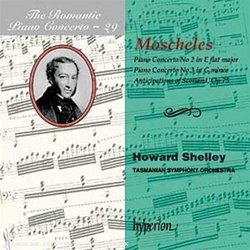| All Artists: Ignaz Moscheles, Howard Shelley, Tasmanian Symphony Orchestra Title: Moscheles: Piano Concerto 2 & 3 Members Wishing: 0 Total Copies: 0 Label: Hyperion UK Release Date: 6/11/2002 Album Type: Import Genre: Classical Styles: Chamber Music, Historical Periods, Classical (c.1770-1830) Number of Discs: 1 SwapaCD Credits: 1 UPC: 034571172767 |
Search - Ignaz Moscheles, Howard Shelley, Tasmanian Symphony Orchestra :: Moscheles: Piano Concerto 2 & 3
 | Ignaz Moscheles, Howard Shelley, Tasmanian Symphony Orchestra Moscheles: Piano Concerto 2 & 3 Genre: Classical |
Larger Image |
CD Details |
CD ReviewsCharming and Brilliant Works for the Piano D. A Wend | Buffalo Grove, IL USA | 09/17/2002 (5 out of 5 stars) "The music of Ignaz Moscheles was new to me, although I have heard the name before. He wrote 8 piano concertos in all, and numbers 2 and 3 were published around 1825. They are charming works in the classical tradition of Mozart but do not have the drama of Beethoven's last three concertos. The keyboard writing is brilliant and the orchestration is a good accompaniment. I find the concertos to be like a cross between Mozart and Chopin, having the technical mastery of the former and the lyricism of the latter. The disc includes a short work called Anticipations of Scotland: A Grand Fantasia. In fact, the work was composed before Moscheles made a visit to Scotland. The work is in 5 parts: an introduction, variations on three popular Scottish songs and a Finale. This was music designed to please his Scottish audience, and it certainly did. I was equally unfamiliar with the Tasmanian Symphony Orchestra. They play superbly, and Howard Shelley in the dual role of pianist-conductor is simply wonderful. The recording clarity could not be better. If you like the concertos of Mozart and Chopin, this disc is a must." In the ranks of the great Dexter Tay | 07/17/2007 (5 out of 5 stars) "Among the "pre-romantics" that flourished in their day, Ignaz Moscheles certainly ranks as one of the most important composers for the piano that has quite sadly fallen into oblivion under the adamantine divisions of western classical music of today. Championed by Beethoven, he was both a protégé and to some extent Beethoven's contemporary, but the influence of his development in the piano's lexicon far outstretched his exact contemporary, Schubert. This comes as little surprise, as Moscheles was primarily a virtuoso pianist-composer, who was, not just adept at writing solo piano music but also of the larger concerto form. That it has not secured a place in the concert repertoire is a mystery and shame; the sublime G minor concerto deserves special mention and the highest recommendation to rank beside those of Beethoven's, Chopin's or Schumman's, for its sheer beauty and masterly cohesion of themes; both pianistically and in terms of orchestration. The first movement introduces a brooding theme by the strings, followed by a Lisztian/Schummanesque introduction in descending, dotted-rhythm octaves. The ensuing theme happens not to be a new theme, but a reiteration of the first theme announced broodingly by the strings. The second lyrical theme of languid beauty, albeit in diaphanous simplicity is repeated several times in the movement as the leitmotiv and lyrical respite, that at times undergoes sublime inversions and harmonic variation. Except for the developmental section, the entire pianistic writing of the movement is not overtly virtuosic, and in this sense, the approach is very similar to say Schumann. The entire movement has more affinity and foreshadows Schumman and Liszt, more than Chopin. The second movement astounds for its ethereal beauty, with a piano writing and harmonic language that must have enraptured the young Chopin. Moscheles' confidence shines through, right up to the last movement, quite unarguably the most virtuosic and challenging of the three. That Moscheles held a high opinion of this work is supported by his choice to perform it for his last public performance during the apogee (arguably the saturation point) of Romanticism, at the time when he had no doubt, been eclisped by the ebb and tide of younger vituosi. The second concerto in E flat major is an attractive work that blazes with ebullience and excursions of a new musical language. Departing from the more conservative first concerto; this work shows prescient Romanticism with no holds barred, following hot on the heels of John Field, perhaps with ever more dazzling virtuosity. A definitive work in the series to own. " Another in a dynamite collection................. Paul | Houston | 10/09/2009 (5 out of 5 stars) "There are some 40 discs in this series and they are all superb HYPERION recordings of works rarely performed or recorded....Highly recommended"
|
